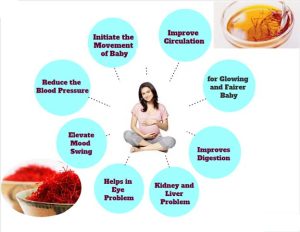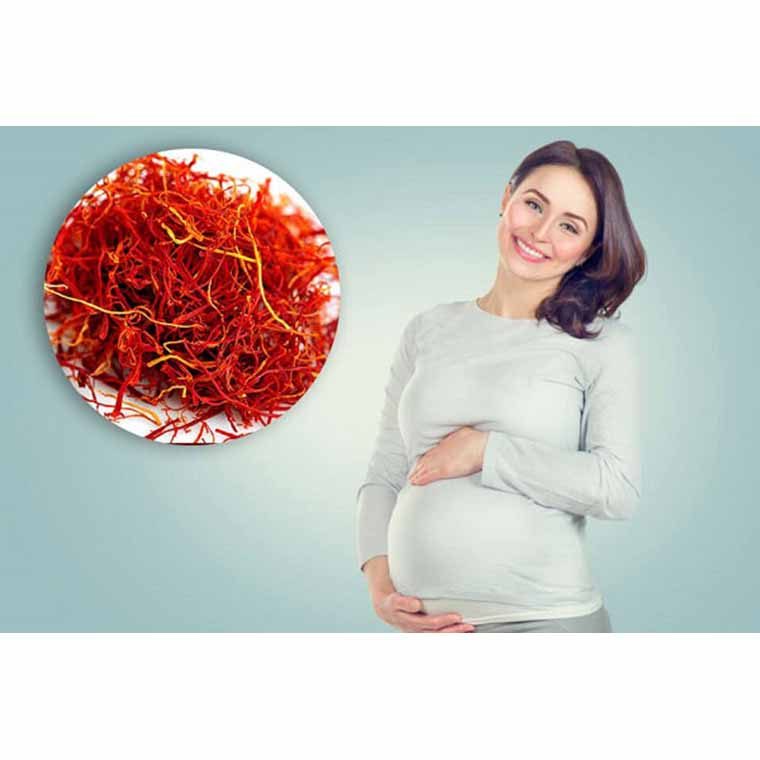Consumption of Saffron During Pregnancy
The consumption of saffron during pregnancy is an important question that can pose challenges for pregnant women. The stress caused by the absence of saffron can sometimes be more dangerous than the consumption of saffron itself. Therefore, increasing public awareness in this area can help reduce these stresses.
Precautions for Consuming Saffron During Pregnancy

1. Avoid Consumption in the First Trimester:
In the first trimester of pregnancy, it is best to completely avoid saffron consumption. If necessary, you can consume a very small amount of saffron threads. Saffron has medicinal properties, but before using it during pregnancy, you should definitely consult your doctor, as excessive consumption can lead to miscarriage.
2. Risk of Miscarriage:
Saffron can cause uterine contractions, and these contractions may lead to miscarriage. Additionally, saffron increases body temperature, and a high body temperature may increase the risk of fetal death. Therefore, consult your doctor before consuming saffron during pregnancy.
3. Increased Sensitivity:
This risk does not affect all pregnant women, but some may experience nausea, headaches, and stress after consuming saffron. If you belong to this group, it is better to avoid saffron consumption.
4. Vomiting:
Vomiting is another side effect of saffron consumption that may occur. This condition is not only unpleasant but can also lead to difficulties in absorbing essential vitamins and minerals for the fetus. Therefore, consulting with a doctor before consuming saffron is very important.
Some Side Effects of Consuming Saffron During Pregnancy
If you experience any of the following symptoms after consuming saffron, be sure to stop its use and consult your doctor:
– Severe numbness in the body
– Blurring vision
– Dizziness and imbalance
– Presence of blood in stool or urine
– Jaundice
Saffron and Increasing Breast Milk
Interestingly, saffron can not only help increase breast milk but also sweeten its taste. This property can aid in better and more nutrition for your child. Therefore, after childbirth, you can consume saffron in moderation and not excessively to have more milk for your baby.
Myths and Delusions about Saffron
Since ancient times, some individuals, especially women, believed that consuming saffron could help enhance the beauty and brightness of the fetus’s skin. However, it should be noted that this belief is incorrect, as the skin color of the fetus is determined genetically and saffron has no effect on it.
Familiarity with the Benefits of Saffron During Pregnancy
– Relief from Stomach and Kidney Pain:
Saffron has antispasmodic properties that can be effective in relieving these pains.
– Increased Appetite and Improved Digestion:
Saffron can aid in improving the digestive process.
– Regulation of Mood Swings and Blood Pressure:
Consumption of saffron can be effective in controlling mood swings and blood pressure.
– Reduction of Morning Sickness:
Saffron can help reduce symptoms of morning sickness.
– Assistance in Preventing Postpartum Bleeding:
Saffron can be effective in reducing postpartum bleeding.
– Useful Source of Protein and Calcium:
Combining saffron with breast milk can be a suitable treatment option.
More Detailed Explanations About the Benefits of Saffron
– Comfortable Sleep with Saffron:
Due to hormonal changes and the growing belly, regular sleep during pregnancy can be challenging. Drinking saffron tea with milk can help you achieve a comfortable and restful sleep.
– Strengthening Digestion and Absorption:
Bloating and constipation are common issues during pregnancy. Consuming saffron can improve blood circulation, enhance metabolism, and ultimately aid in food digestion.
– Relieving Distressing Emotions During Pregnancy:
Hormonal changes during pregnancy can lead to severe mood changes. Consuming saffron can help regulate and balance mood.
– Protection Against Cardiovascular Diseases:
Nutrition during pregnancy plays a vital role in heart health. Saffron, with its crocin, antioxidants, and potassium, can help protect the heart and reduce triglyceride and cholesterol levels.



